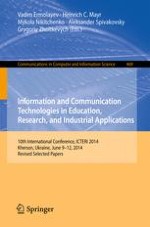2014 | Book
Information and Communication Technologies in Education, Research, and Industrial Applications
10th International Conference, ICTERI 2014, Kherson, Ukraine, June 9-12, 2014, Revised Selected Papers
Editors: Vadim Ermolayev, Heinrich C. Mayr, Mykola Nikitchenko, Aleksander Spivakovsky, Grygoriy Zholtkevych
Publisher: Springer International Publishing
Book Series : Communications in Computer and Information Science
